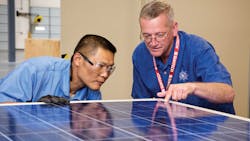Coming to America to Seek 'Made in the U.S.' Label
Here is an intriguing scenario. A non-U.S. based company receives funds to set up shop in the United States, then acquires the label “Made in USA” and consequently secures customers where U.S.-produced products are a prerequisite.
That is exactly what happened with Suntech Power Holdings Co., a Chinese solar-panel manufacturer. While a number of forces converged that led up to the company locating in Goodyear, Ariz., one component was the American Recovery and Reinvestment Act (ARRA) funding to the tune of $2 million that the company received for locating in the United States.
Because the solar panels produced at the company’s U.S. location fit ARRA’s Buy American provisions, Suntech even received an order to supply 3.4 megawatts worth of solar panels for Edwards Air Force Base in Southern California.
“The ‘Made in America’ label is essential to some of our customers including utility companies,” says John Lefevbre, president of Suntech America.
“We consider the designation a market differential,” Securing customers, explains Barry Broome, CEO of the Greater Phoenix Economic Council, is the driver that leads companies to put down roots in the United States.
“For companies like Suntech that deal with new technology the most important consideration is the availability of customers,” Broome says. “For the state the issue is how many jobs will it create.”
Job creation, with a decidedly “Made in America” stamp, flows through the supply chain.
Rioglass Solar, which is based in Madrid, located to Surprise, Ariz., to serve its major customer Abengoa Solar Inc. as the primary mirror manufacturer. Both companies have received ARRA funding.
“Having our product produced in the U.S. is important to our customers,” explains Greg Armstrong, COO of Rioglass. “In fact our first U.S. factory, which opened in 2011, is now producing almost the same amount as our two factories in Spain.” The company received other incentives as well, including a $10 million investment tax credit as a component supplier for the solar industry, which offsets its $47 million investment.
On the Fast Track
“Made in America” status also proved profitable for Japanese manufacturer Nippon Sharyo, which opened a manufacturing facility in July in Illinois. That allowed the company to meet Federal Railroad Administration’s requirements for competing on contracts to assemble high-speed rail cars.
The new factory will start rolling out product in September 2012 for the contract it was awarded by METRA (the Northeast Illinois commuter rail system) to build its next generation of rail cars. The last car will be finished in 2015. Nippon Sharyo received a package of more than $10 million from the state of Illinois to help with its expansion there.
For companies that are formulating strategic plans for future growth, the quest for the prized “Made in America” status is significant. MaxLite, which manufactures indoor and outdoor lighting fixtures featuring LED luminaries and lamps, opened its first U.S. line in New Jersey in July.
“While our first assembly plant was established to provide a faster lead time to serve customers, given our revenues from the LED market have grown quickly, our next expansion will include the “Made in America” designation, which is necessary for growth,” says MaxLite CEO Yon Sung. “Serving the municipal and federal markets, which require “Made in America” status, could be as large as 20% of our future business.”
Along with its strategic decision to locate in the United States, Suntech Power also is making a point to hire ex-U.S. military personnel.
“Approximately 5% to 6% of our workforce is former military personnel,” Lefebvre says. “They have the training, discipline and ethics that create an excellent workforce.”

